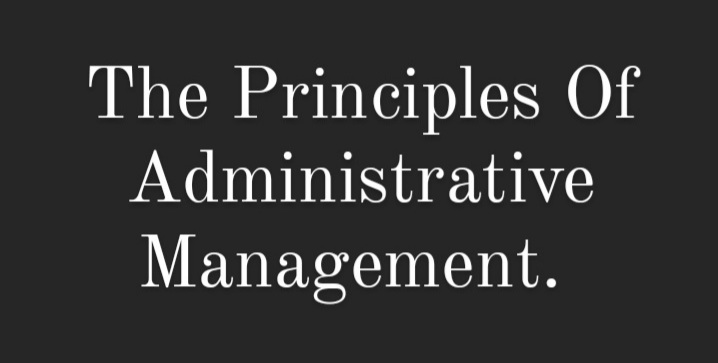
Administrative management is classical management theory developed by the French mining engineer Henri Fayol (1841-1923) in his book “Industrial and general administration ” published in 1916.
Fayol suggested 14 principles that focus on the administrative side of management.
This theory generally calls for a formalized administrative structure.
For Fayol, who was trying to find a rational way to design an organization as a whole,
these principles would lead to creating an efficient company structure.

1. Division of labor:
Work should be broken down. The process is devided into a number of tasks (or sets of tasks), and each one is assigned to a particular person or a group of people.
Division of work helps the employees be more productive and efficient
2. Authority / Responsibility:
The two go hand in hand, with responsibility being the duty to achieve results, authority being the power to give direction.
3. Discipline:
Employees must obey orders, but leaders must assume real leadership. Employees’ good behavior help them progress in their professional careers.
4. Unity of command:
The same person can only receive instructions from one manager. Otherwise there can be conflicts and confusion.
5. Unity of direction:
The objectives must be shared around a single goal in order to promote the convergence of efforts and the coherence of actions.
6. Subordination of Individual Interest:
The ambitions and interests of the company always outweigh the personnal ones.
7. Fair remuneration:
Everyone in the company should receive sufficient and fair compensation.
8. Centralization:
A central system implies that activities involving planning and decision-making are concentrated to specific leader(s). The decision-making powers are retained in the head office, and all other offices receive commands from the main office.
9. Hierarchy:
A hierarchy is essential for the unity of meaning and helps every employee knows their immediate senior. But transversal relationships are also necessary.
10. Order:
Company resources are carefully organized for the best possible efficiency.
The company should maintain a well-defined work order to have a favourable work culture that will boost the productivity.
11. Equity:
Everyone in the company should be treated fairly according to the same rules.
12. Staff stability:
Competent and motivated staff only remain so if they are respected and maintained in a certain job security.
13. Initiative:
The manager has to constantly support and encourage his employees to take initiatives in an organization.
14. Esprit de corps:
It is up to leaders to cultivate harmony, cohesion and trust within the company by constantly motivating their employees, supporting them and developing trust and mutual understanding .
Despite the evolution this field has witnessed and all the theories that succeeded administrative management, these principles are still applicable on today’s businesses and mangers still consider them as an essential reference in their work. A lot of academics see Fayol’s ideas as the foundation basis of all management theories that came later.
Check out our new ebook about the 8 leadership qualities that no leader can do without !
